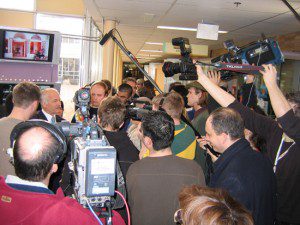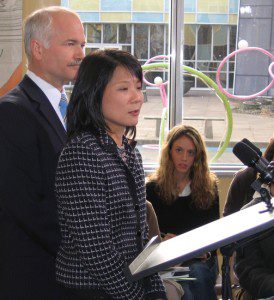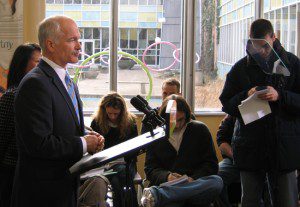
Jack Layton gave me and my teaching colleagues a gift we shall always cherish. It was a political gift, yes. It actually took place in front of news cameras – during the 2006 federal election – so it was also a public gift. It was a gift that probably wasn’t appreciated by the mainstream media reporters present that day. That’s because, for a few moments, he ignored the big-name reporters from CTV, CBC and Global Television in Toronto in favour of the lesser known, less experienced and less jaded reporters – some of our first-year journalism students.
“I’ll take questions first from the Centennial College journalists,” Jack Layton said during the press conference that day.
It was just another media moment in the winter election of 2006, the one pitting NDP leader Jack Layton against incumbent Prime Minister Paul Martin and Conservative leader Stephen Harper. As each federal leader generally does during an election, Jack Layton planned to announce his party’s education policies at an appropriate venue. We convinced him to do it at the East York campus of Centennial College because we’re located in the heart of his Toronto-Danforth riding.
That itself was a Layton gift – allowing our communications students to witness an election policy unveiling and reporter scrum first-hand. But instead of using the college and its student body merely as a backdrop for his policy announcement, Jack gave our journalism students first crack at questioning him in the media scrum. It was a gift to them and through them, to us.

Alexis Dobranowski, then a first-year journalism student, remembered the moment for me this week.
“Jack didn’t come to our school to get the media sound-bite; he came there to talk to us,” she said. “And that resonated for all of us.”
My day, my summer came to a crashing halt on Monday morning when I heard on radio that cancer had killed Jack Layton at age 61. Despite losing body weight, a lot of his strength and much of his energy, last spring, Jack had beaten back prostate cancer even as he led his now 50-year-old federal New Democratic Party to its best showing ever – 103 seats in the House of Commons – and earned for himself (and for the first time the NDP) Official Opposition status.
And how had he done it? Not with rhetoric or political promises and certainly not with war chests overflowing with money. No, in fact, Jack Layton had not won Official Opposition status by defeating others, but, as Toronto Councillor Adam Vaughan suggested this week, “by winning his opponents over.”
As further proof, I’ll describe another gift Jack Layton gave me. For a number of years, I volunteered some of my free time to a series of panel discussions, known as the St. Lawrence Forum (at the St. Lawrence Centre of the Arts in Toronto). These free-wheeling forums brought issues such as climate change, taxation, retirement, medical care, city-state status for Toronto and homelessness in front of audiences for public debate. I emceed the forums. I remember distinctly one night – during a forum on housing – Jack Layton was sitting in the audience taking notes. He might easily have participated on stage as a panellist.
On this night, however, and despite his busy schedule, he had given credence to our forum, simply by coming to a floor microphone and posing a question as an average citizen concerned about the welfare of those who, for reasons beyond their control, had become homeless and alone. When I realized who he was, I recognized him to the audience. But he insisted he wasn’t representing a city municipality, not a federal constituency or even a political party. No. This night he was citizen John Gilbert “Jack” Layton seeking answers to potentially life-threatening circumstances faced by some of his neighbours.
As many have learned in the past few weeks, Jack Layton dealt with his cancer very much the way he lived life – as a fighter. He never stopped campaigning. He never stopped generating ideas for improving the country he loved. In his now much publicized Letter to Canadians, it appears Jack Layton left his greatest gift to the young.

“All my life I have worked to make things better [and] young people have been a great source of inspiration for me,” Jack wrote in his published letter. “I believe in you. Your energy, your vision, your passion for justice are exactly what this country needs today.”
As Alexis Dobranowski, one of my former students and now a successful journalist and communications writer, put it: “It’s a testament to the kind of man he was,” she said. “He wasn’t looking out for himself… He was looking out for the next generation of Canadians.”
CEOs and Prime Ministers have lived and died never having earned that kind of respect, never having bestowed a worthier gift.
Ted, thanks for writing so eloquently about a day none of us who were there will ever forget. the photo of us all on Page 6 of the Toronto star showed Jack scrumming eye to eye with the students while the national media tried hard to get near him…it was amazing, and the students all remember it to this day in their professional careers five years later.